Role of HR Director in Recruitment and Expatriation in International Management
VerifiedAdded on 2022/12/01
|9
|2792
|325
AI Summary
This document discusses the role of HR director in recruitment and expatriation in international management. It explores the reasons why expatriation is widely used in a globalized economy and the causes of expatriate failure. The findings have implications for the HR director of PORTO SEGURO and provide insights for staffing planning.
Contribute Materials
Your contribution can guide someone’s learning journey. Share your
documents today.
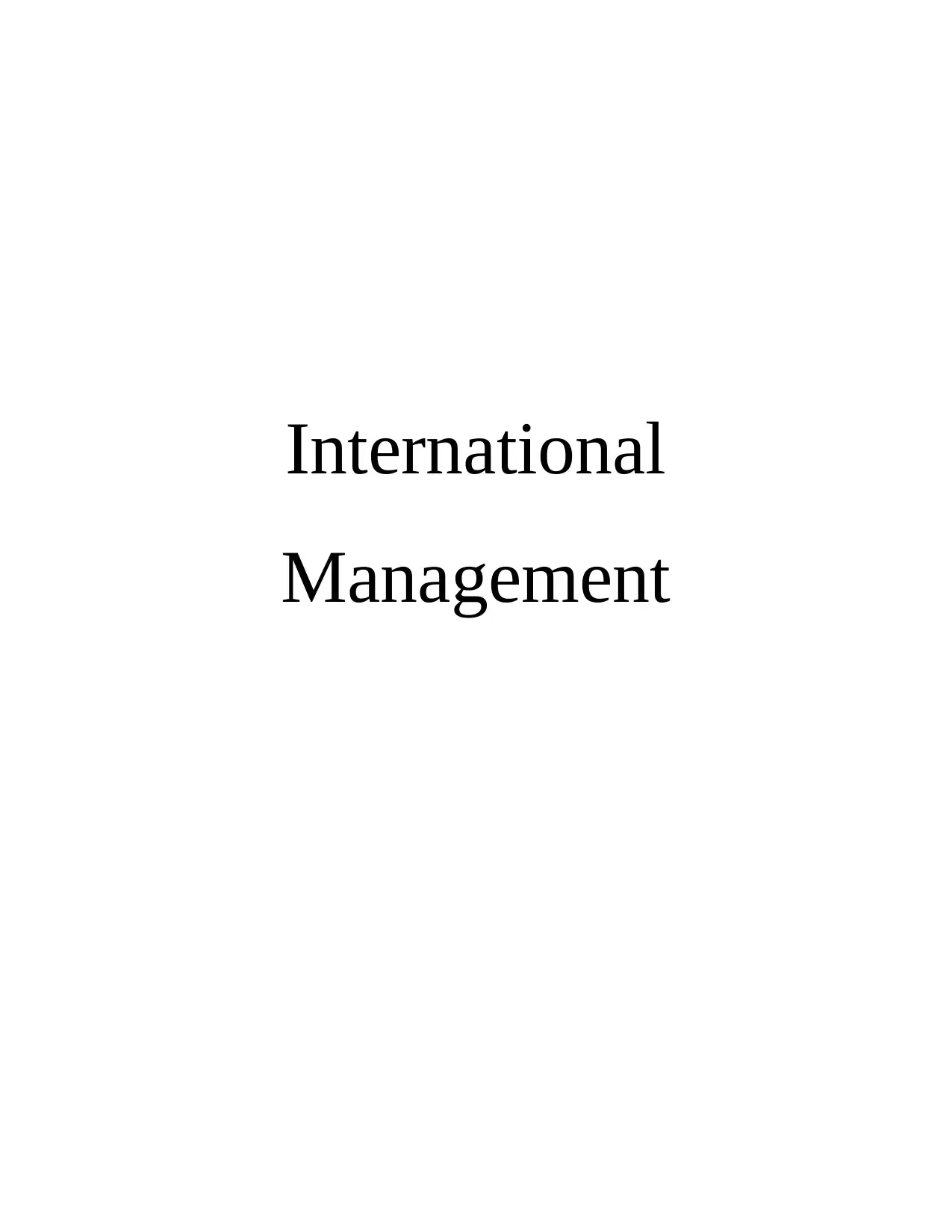
International
Management
Management
Secure Best Marks with AI Grader
Need help grading? Try our AI Grader for instant feedback on your assignments.
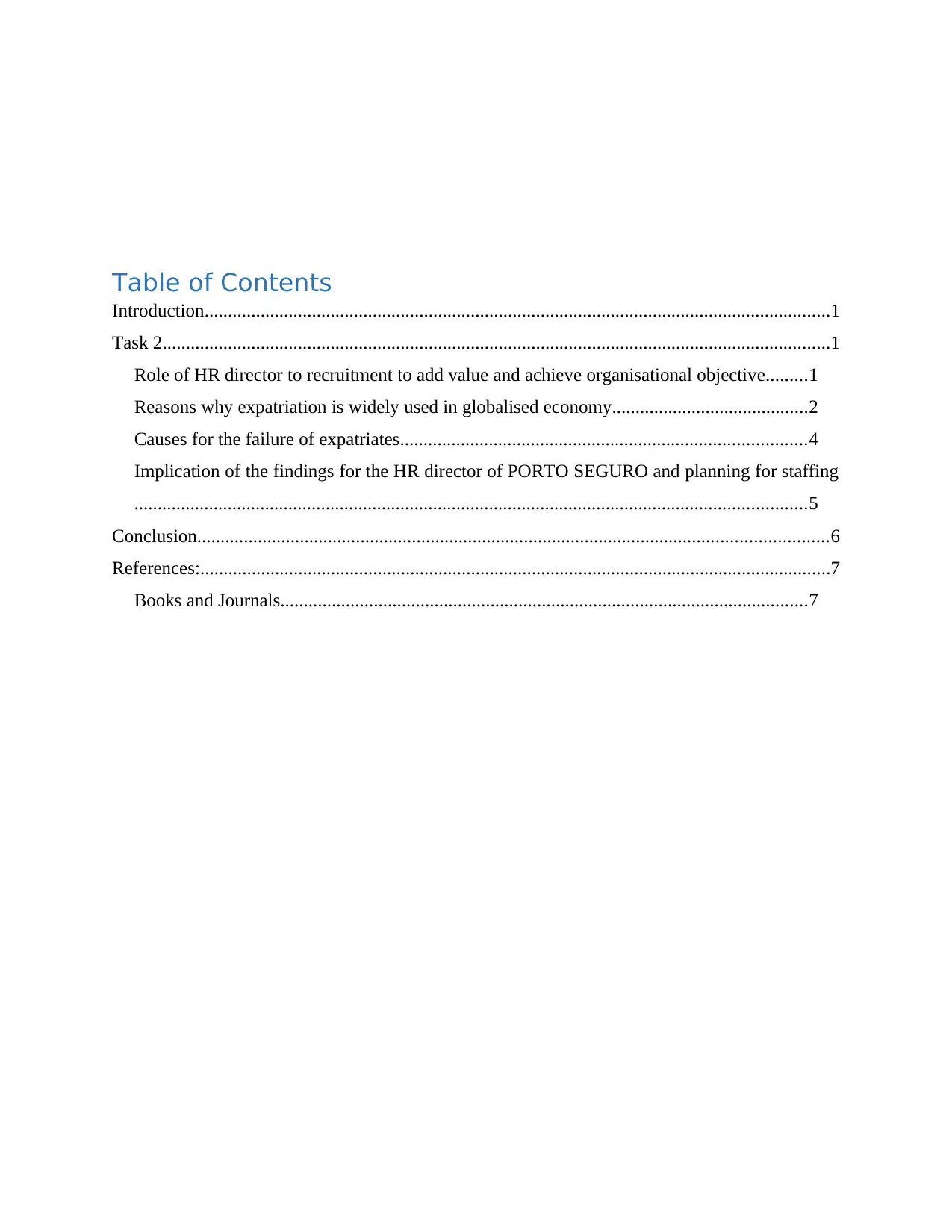
Table of Contents
Introduction......................................................................................................................................1
Task 2...............................................................................................................................................1
Role of HR director to recruitment to add value and achieve organisational objective.........1
Reasons why expatriation is widely used in globalised economy..........................................2
Causes for the failure of expatriates.......................................................................................4
Implication of the findings for the HR director of PORTO SEGURO and planning for staffing
................................................................................................................................................5
Conclusion.......................................................................................................................................6
References:.......................................................................................................................................7
Books and Journals.................................................................................................................7
Introduction......................................................................................................................................1
Task 2...............................................................................................................................................1
Role of HR director to recruitment to add value and achieve organisational objective.........1
Reasons why expatriation is widely used in globalised economy..........................................2
Causes for the failure of expatriates.......................................................................................4
Implication of the findings for the HR director of PORTO SEGURO and planning for staffing
................................................................................................................................................5
Conclusion.......................................................................................................................................6
References:.......................................................................................................................................7
Books and Journals.................................................................................................................7
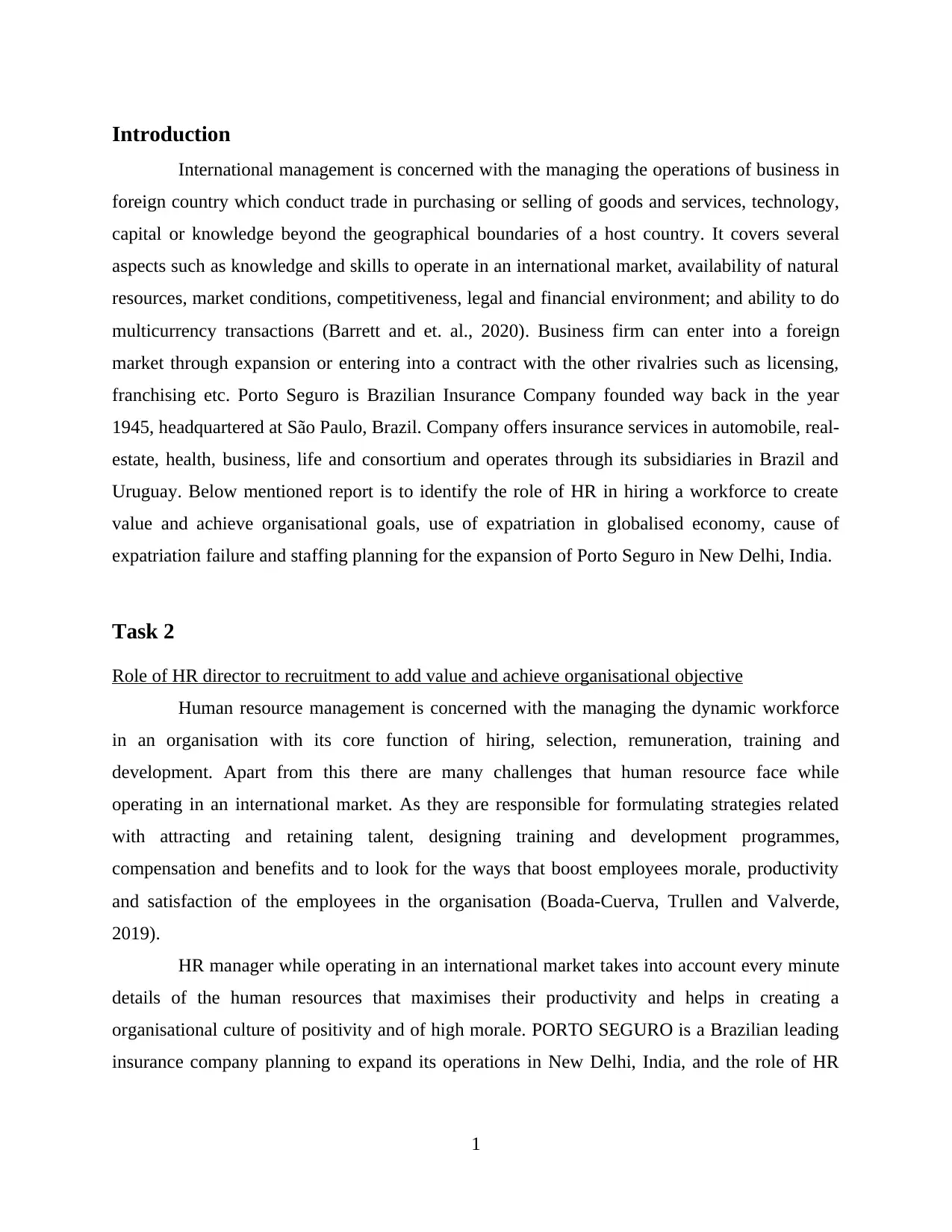
Introduction
International management is concerned with the managing the operations of business in
foreign country which conduct trade in purchasing or selling of goods and services, technology,
capital or knowledge beyond the geographical boundaries of a host country. It covers several
aspects such as knowledge and skills to operate in an international market, availability of natural
resources, market conditions, competitiveness, legal and financial environment; and ability to do
multicurrency transactions (Barrett and et. al., 2020). Business firm can enter into a foreign
market through expansion or entering into a contract with the other rivalries such as licensing,
franchising etc. Porto Seguro is Brazilian Insurance Company founded way back in the year
1945, headquartered at São Paulo, Brazil. Company offers insurance services in automobile, real-
estate, health, business, life and consortium and operates through its subsidiaries in Brazil and
Uruguay. Below mentioned report is to identify the role of HR in hiring a workforce to create
value and achieve organisational goals, use of expatriation in globalised economy, cause of
expatriation failure and staffing planning for the expansion of Porto Seguro in New Delhi, India.
Task 2
Role of HR director to recruitment to add value and achieve organisational objective
Human resource management is concerned with the managing the dynamic workforce
in an organisation with its core function of hiring, selection, remuneration, training and
development. Apart from this there are many challenges that human resource face while
operating in an international market. As they are responsible for formulating strategies related
with attracting and retaining talent, designing training and development programmes,
compensation and benefits and to look for the ways that boost employees morale, productivity
and satisfaction of the employees in the organisation (Boada-Cuerva, Trullen and Valverde,
2019).
HR manager while operating in an international market takes into account every minute
details of the human resources that maximises their productivity and helps in creating a
organisational culture of positivity and of high morale. PORTO SEGURO is a Brazilian leading
insurance company planning to expand its operations in New Delhi, India, and the role of HR
1
International management is concerned with the managing the operations of business in
foreign country which conduct trade in purchasing or selling of goods and services, technology,
capital or knowledge beyond the geographical boundaries of a host country. It covers several
aspects such as knowledge and skills to operate in an international market, availability of natural
resources, market conditions, competitiveness, legal and financial environment; and ability to do
multicurrency transactions (Barrett and et. al., 2020). Business firm can enter into a foreign
market through expansion or entering into a contract with the other rivalries such as licensing,
franchising etc. Porto Seguro is Brazilian Insurance Company founded way back in the year
1945, headquartered at São Paulo, Brazil. Company offers insurance services in automobile, real-
estate, health, business, life and consortium and operates through its subsidiaries in Brazil and
Uruguay. Below mentioned report is to identify the role of HR in hiring a workforce to create
value and achieve organisational goals, use of expatriation in globalised economy, cause of
expatriation failure and staffing planning for the expansion of Porto Seguro in New Delhi, India.
Task 2
Role of HR director to recruitment to add value and achieve organisational objective
Human resource management is concerned with the managing the dynamic workforce
in an organisation with its core function of hiring, selection, remuneration, training and
development. Apart from this there are many challenges that human resource face while
operating in an international market. As they are responsible for formulating strategies related
with attracting and retaining talent, designing training and development programmes,
compensation and benefits and to look for the ways that boost employees morale, productivity
and satisfaction of the employees in the organisation (Boada-Cuerva, Trullen and Valverde,
2019).
HR manager while operating in an international market takes into account every minute
details of the human resources that maximises their productivity and helps in creating a
organisational culture of positivity and of high morale. PORTO SEGURO is a Brazilian leading
insurance company planning to expand its operations in New Delhi, India, and the role of HR
1
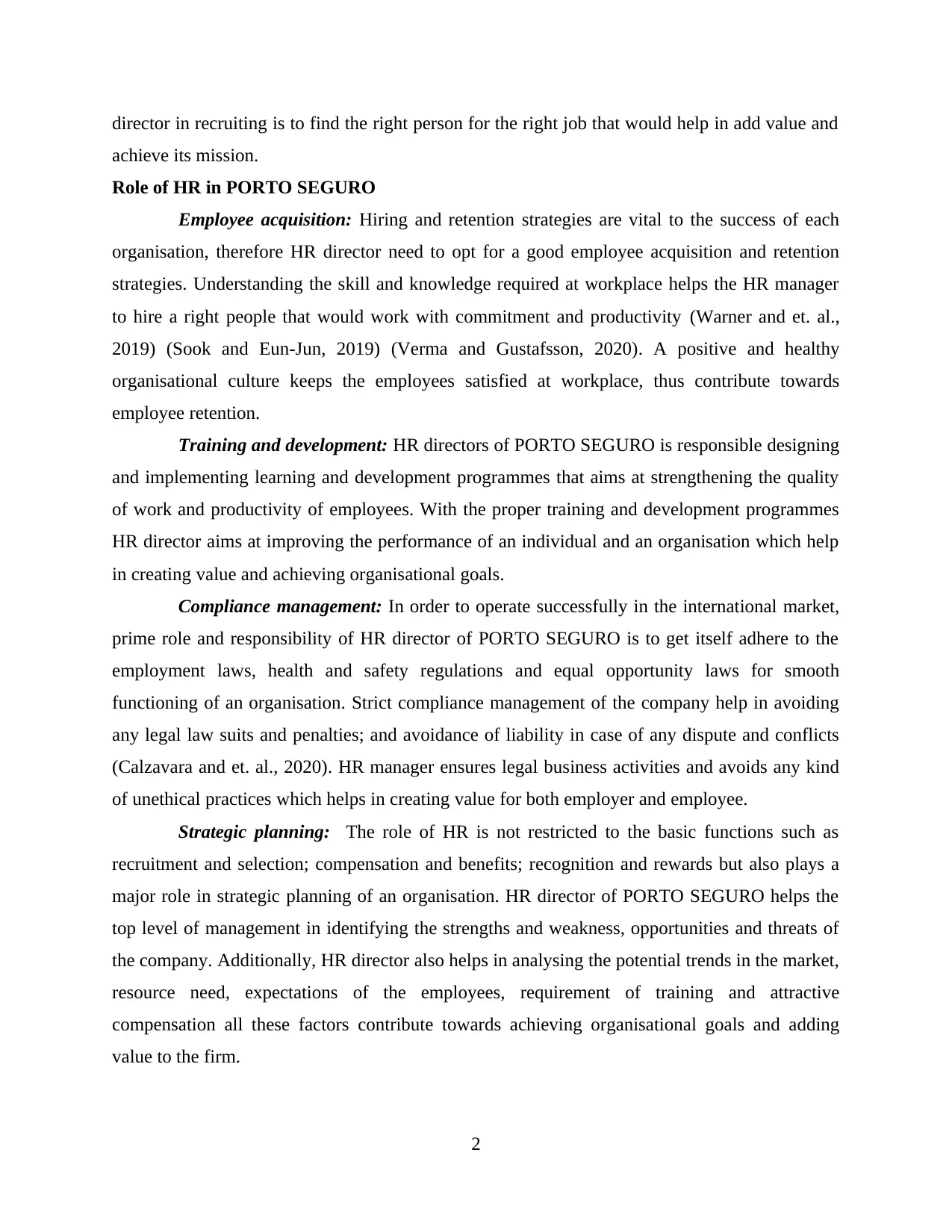
director in recruiting is to find the right person for the right job that would help in add value and
achieve its mission.
Role of HR in PORTO SEGURO
Employee acquisition: Hiring and retention strategies are vital to the success of each
organisation, therefore HR director need to opt for a good employee acquisition and retention
strategies. Understanding the skill and knowledge required at workplace helps the HR manager
to hire a right people that would work with commitment and productivity (Warner and et. al.,
2019) (Sook and Eun-Jun, 2019) (Verma and Gustafsson, 2020). A positive and healthy
organisational culture keeps the employees satisfied at workplace, thus contribute towards
employee retention.
Training and development: HR directors of PORTO SEGURO is responsible designing
and implementing learning and development programmes that aims at strengthening the quality
of work and productivity of employees. With the proper training and development programmes
HR director aims at improving the performance of an individual and an organisation which help
in creating value and achieving organisational goals.
Compliance management: In order to operate successfully in the international market,
prime role and responsibility of HR director of PORTO SEGURO is to get itself adhere to the
employment laws, health and safety regulations and equal opportunity laws for smooth
functioning of an organisation. Strict compliance management of the company help in avoiding
any legal law suits and penalties; and avoidance of liability in case of any dispute and conflicts
(Calzavara and et. al., 2020). HR manager ensures legal business activities and avoids any kind
of unethical practices which helps in creating value for both employer and employee.
Strategic planning: The role of HR is not restricted to the basic functions such as
recruitment and selection; compensation and benefits; recognition and rewards but also plays a
major role in strategic planning of an organisation. HR director of PORTO SEGURO helps the
top level of management in identifying the strengths and weakness, opportunities and threats of
the company. Additionally, HR director also helps in analysing the potential trends in the market,
resource need, expectations of the employees, requirement of training and attractive
compensation all these factors contribute towards achieving organisational goals and adding
value to the firm.
2
achieve its mission.
Role of HR in PORTO SEGURO
Employee acquisition: Hiring and retention strategies are vital to the success of each
organisation, therefore HR director need to opt for a good employee acquisition and retention
strategies. Understanding the skill and knowledge required at workplace helps the HR manager
to hire a right people that would work with commitment and productivity (Warner and et. al.,
2019) (Sook and Eun-Jun, 2019) (Verma and Gustafsson, 2020). A positive and healthy
organisational culture keeps the employees satisfied at workplace, thus contribute towards
employee retention.
Training and development: HR directors of PORTO SEGURO is responsible designing
and implementing learning and development programmes that aims at strengthening the quality
of work and productivity of employees. With the proper training and development programmes
HR director aims at improving the performance of an individual and an organisation which help
in creating value and achieving organisational goals.
Compliance management: In order to operate successfully in the international market,
prime role and responsibility of HR director of PORTO SEGURO is to get itself adhere to the
employment laws, health and safety regulations and equal opportunity laws for smooth
functioning of an organisation. Strict compliance management of the company help in avoiding
any legal law suits and penalties; and avoidance of liability in case of any dispute and conflicts
(Calzavara and et. al., 2020). HR manager ensures legal business activities and avoids any kind
of unethical practices which helps in creating value for both employer and employee.
Strategic planning: The role of HR is not restricted to the basic functions such as
recruitment and selection; compensation and benefits; recognition and rewards but also plays a
major role in strategic planning of an organisation. HR director of PORTO SEGURO helps the
top level of management in identifying the strengths and weakness, opportunities and threats of
the company. Additionally, HR director also helps in analysing the potential trends in the market,
resource need, expectations of the employees, requirement of training and attractive
compensation all these factors contribute towards achieving organisational goals and adding
value to the firm.
2
Secure Best Marks with AI Grader
Need help grading? Try our AI Grader for instant feedback on your assignments.
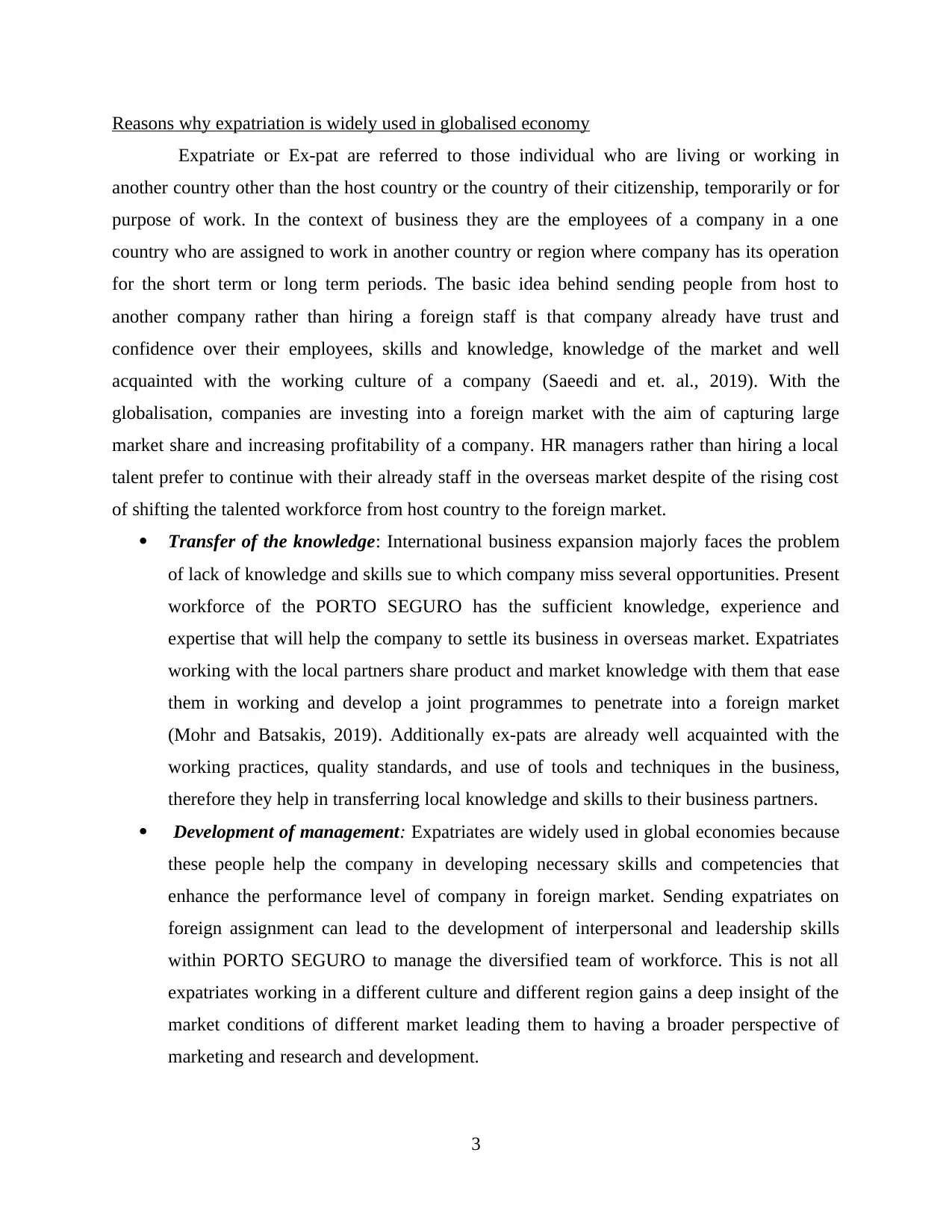
Reasons why expatriation is widely used in globalised economy
Expatriate or Ex-pat are referred to those individual who are living or working in
another country other than the host country or the country of their citizenship, temporarily or for
purpose of work. In the context of business they are the employees of a company in a one
country who are assigned to work in another country or region where company has its operation
for the short term or long term periods. The basic idea behind sending people from host to
another company rather than hiring a foreign staff is that company already have trust and
confidence over their employees, skills and knowledge, knowledge of the market and well
acquainted with the working culture of a company (Saeedi and et. al., 2019). With the
globalisation, companies are investing into a foreign market with the aim of capturing large
market share and increasing profitability of a company. HR managers rather than hiring a local
talent prefer to continue with their already staff in the overseas market despite of the rising cost
of shifting the talented workforce from host country to the foreign market.
Transfer of the knowledge: International business expansion majorly faces the problem
of lack of knowledge and skills sue to which company miss several opportunities. Present
workforce of the PORTO SEGURO has the sufficient knowledge, experience and
expertise that will help the company to settle its business in overseas market. Expatriates
working with the local partners share product and market knowledge with them that ease
them in working and develop a joint programmes to penetrate into a foreign market
(Mohr and Batsakis, 2019). Additionally ex-pats are already well acquainted with the
working practices, quality standards, and use of tools and techniques in the business,
therefore they help in transferring local knowledge and skills to their business partners.
Development of management: Expatriates are widely used in global economies because
these people help the company in developing necessary skills and competencies that
enhance the performance level of company in foreign market. Sending expatriates on
foreign assignment can lead to the development of interpersonal and leadership skills
within PORTO SEGURO to manage the diversified team of workforce. This is not all
expatriates working in a different culture and different region gains a deep insight of the
market conditions of different market leading them to having a broader perspective of
marketing and research and development.
3
Expatriate or Ex-pat are referred to those individual who are living or working in
another country other than the host country or the country of their citizenship, temporarily or for
purpose of work. In the context of business they are the employees of a company in a one
country who are assigned to work in another country or region where company has its operation
for the short term or long term periods. The basic idea behind sending people from host to
another company rather than hiring a foreign staff is that company already have trust and
confidence over their employees, skills and knowledge, knowledge of the market and well
acquainted with the working culture of a company (Saeedi and et. al., 2019). With the
globalisation, companies are investing into a foreign market with the aim of capturing large
market share and increasing profitability of a company. HR managers rather than hiring a local
talent prefer to continue with their already staff in the overseas market despite of the rising cost
of shifting the talented workforce from host country to the foreign market.
Transfer of the knowledge: International business expansion majorly faces the problem
of lack of knowledge and skills sue to which company miss several opportunities. Present
workforce of the PORTO SEGURO has the sufficient knowledge, experience and
expertise that will help the company to settle its business in overseas market. Expatriates
working with the local partners share product and market knowledge with them that ease
them in working and develop a joint programmes to penetrate into a foreign market
(Mohr and Batsakis, 2019). Additionally ex-pats are already well acquainted with the
working practices, quality standards, and use of tools and techniques in the business,
therefore they help in transferring local knowledge and skills to their business partners.
Development of management: Expatriates are widely used in global economies because
these people help the company in developing necessary skills and competencies that
enhance the performance level of company in foreign market. Sending expatriates on
foreign assignment can lead to the development of interpersonal and leadership skills
within PORTO SEGURO to manage the diversified team of workforce. This is not all
expatriates working in a different culture and different region gains a deep insight of the
market conditions of different market leading them to having a broader perspective of
marketing and research and development.
3
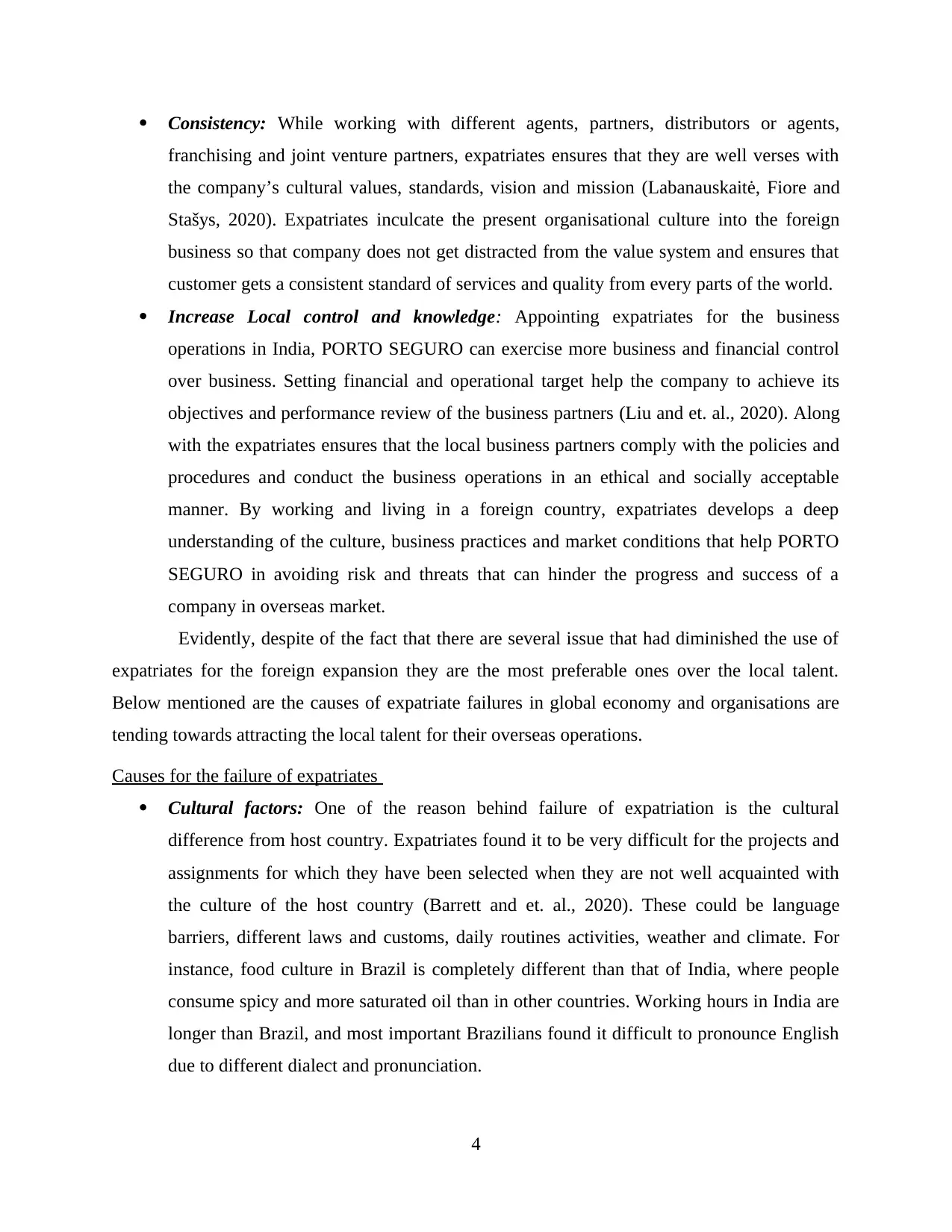
Consistency: While working with different agents, partners, distributors or agents,
franchising and joint venture partners, expatriates ensures that they are well verses with
the company’s cultural values, standards, vision and mission (Labanauskaitė, Fiore and
Stašys, 2020). Expatriates inculcate the present organisational culture into the foreign
business so that company does not get distracted from the value system and ensures that
customer gets a consistent standard of services and quality from every parts of the world.
Increase Local control and knowledge: Appointing expatriates for the business
operations in India, PORTO SEGURO can exercise more business and financial control
over business. Setting financial and operational target help the company to achieve its
objectives and performance review of the business partners (Liu and et. al., 2020). Along
with the expatriates ensures that the local business partners comply with the policies and
procedures and conduct the business operations in an ethical and socially acceptable
manner. By working and living in a foreign country, expatriates develops a deep
understanding of the culture, business practices and market conditions that help PORTO
SEGURO in avoiding risk and threats that can hinder the progress and success of a
company in overseas market.
Evidently, despite of the fact that there are several issue that had diminished the use of
expatriates for the foreign expansion they are the most preferable ones over the local talent.
Below mentioned are the causes of expatriate failures in global economy and organisations are
tending towards attracting the local talent for their overseas operations.
Causes for the failure of expatriates
Cultural factors: One of the reason behind failure of expatriation is the cultural
difference from host country. Expatriates found it to be very difficult for the projects and
assignments for which they have been selected when they are not well acquainted with
the culture of the host country (Barrett and et. al., 2020). These could be language
barriers, different laws and customs, daily routines activities, weather and climate. For
instance, food culture in Brazil is completely different than that of India, where people
consume spicy and more saturated oil than in other countries. Working hours in India are
longer than Brazil, and most important Brazilians found it difficult to pronounce English
due to different dialect and pronunciation.
4
franchising and joint venture partners, expatriates ensures that they are well verses with
the company’s cultural values, standards, vision and mission (Labanauskaitė, Fiore and
Stašys, 2020). Expatriates inculcate the present organisational culture into the foreign
business so that company does not get distracted from the value system and ensures that
customer gets a consistent standard of services and quality from every parts of the world.
Increase Local control and knowledge: Appointing expatriates for the business
operations in India, PORTO SEGURO can exercise more business and financial control
over business. Setting financial and operational target help the company to achieve its
objectives and performance review of the business partners (Liu and et. al., 2020). Along
with the expatriates ensures that the local business partners comply with the policies and
procedures and conduct the business operations in an ethical and socially acceptable
manner. By working and living in a foreign country, expatriates develops a deep
understanding of the culture, business practices and market conditions that help PORTO
SEGURO in avoiding risk and threats that can hinder the progress and success of a
company in overseas market.
Evidently, despite of the fact that there are several issue that had diminished the use of
expatriates for the foreign expansion they are the most preferable ones over the local talent.
Below mentioned are the causes of expatriate failures in global economy and organisations are
tending towards attracting the local talent for their overseas operations.
Causes for the failure of expatriates
Cultural factors: One of the reason behind failure of expatriation is the cultural
difference from host country. Expatriates found it to be very difficult for the projects and
assignments for which they have been selected when they are not well acquainted with
the culture of the host country (Barrett and et. al., 2020). These could be language
barriers, different laws and customs, daily routines activities, weather and climate. For
instance, food culture in Brazil is completely different than that of India, where people
consume spicy and more saturated oil than in other countries. Working hours in India are
longer than Brazil, and most important Brazilians found it difficult to pronounce English
due to different dialect and pronunciation.
4
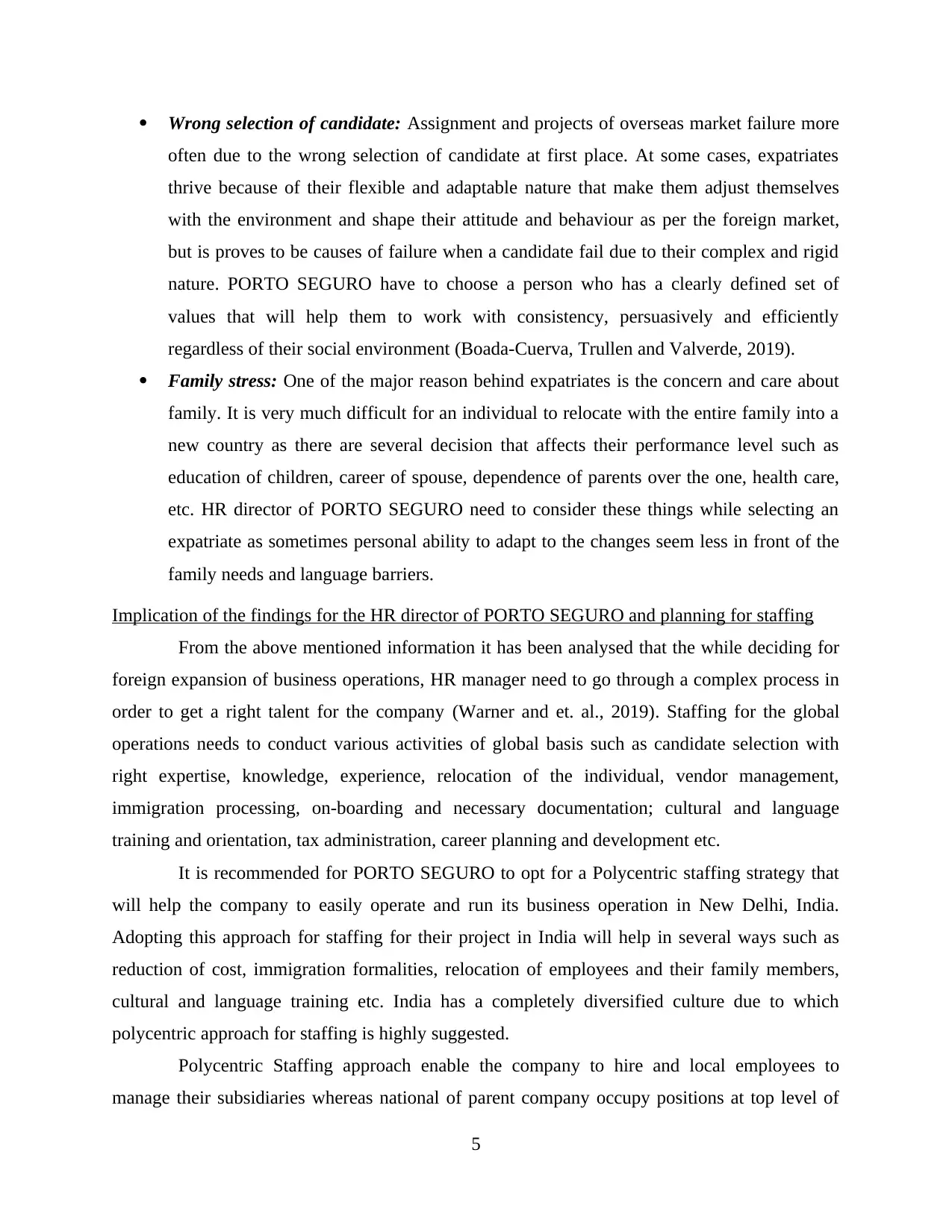
Wrong selection of candidate: Assignment and projects of overseas market failure more
often due to the wrong selection of candidate at first place. At some cases, expatriates
thrive because of their flexible and adaptable nature that make them adjust themselves
with the environment and shape their attitude and behaviour as per the foreign market,
but is proves to be causes of failure when a candidate fail due to their complex and rigid
nature. PORTO SEGURO have to choose a person who has a clearly defined set of
values that will help them to work with consistency, persuasively and efficiently
regardless of their social environment (Boada-Cuerva, Trullen and Valverde, 2019).
Family stress: One of the major reason behind expatriates is the concern and care about
family. It is very much difficult for an individual to relocate with the entire family into a
new country as there are several decision that affects their performance level such as
education of children, career of spouse, dependence of parents over the one, health care,
etc. HR director of PORTO SEGURO need to consider these things while selecting an
expatriate as sometimes personal ability to adapt to the changes seem less in front of the
family needs and language barriers.
Implication of the findings for the HR director of PORTO SEGURO and planning for staffing
From the above mentioned information it has been analysed that the while deciding for
foreign expansion of business operations, HR manager need to go through a complex process in
order to get a right talent for the company (Warner and et. al., 2019). Staffing for the global
operations needs to conduct various activities of global basis such as candidate selection with
right expertise, knowledge, experience, relocation of the individual, vendor management,
immigration processing, on-boarding and necessary documentation; cultural and language
training and orientation, tax administration, career planning and development etc.
It is recommended for PORTO SEGURO to opt for a Polycentric staffing strategy that
will help the company to easily operate and run its business operation in New Delhi, India.
Adopting this approach for staffing for their project in India will help in several ways such as
reduction of cost, immigration formalities, relocation of employees and their family members,
cultural and language training etc. India has a completely diversified culture due to which
polycentric approach for staffing is highly suggested.
Polycentric Staffing approach enable the company to hire and local employees to
manage their subsidiaries whereas national of parent company occupy positions at top level of
5
often due to the wrong selection of candidate at first place. At some cases, expatriates
thrive because of their flexible and adaptable nature that make them adjust themselves
with the environment and shape their attitude and behaviour as per the foreign market,
but is proves to be causes of failure when a candidate fail due to their complex and rigid
nature. PORTO SEGURO have to choose a person who has a clearly defined set of
values that will help them to work with consistency, persuasively and efficiently
regardless of their social environment (Boada-Cuerva, Trullen and Valverde, 2019).
Family stress: One of the major reason behind expatriates is the concern and care about
family. It is very much difficult for an individual to relocate with the entire family into a
new country as there are several decision that affects their performance level such as
education of children, career of spouse, dependence of parents over the one, health care,
etc. HR director of PORTO SEGURO need to consider these things while selecting an
expatriate as sometimes personal ability to adapt to the changes seem less in front of the
family needs and language barriers.
Implication of the findings for the HR director of PORTO SEGURO and planning for staffing
From the above mentioned information it has been analysed that the while deciding for
foreign expansion of business operations, HR manager need to go through a complex process in
order to get a right talent for the company (Warner and et. al., 2019). Staffing for the global
operations needs to conduct various activities of global basis such as candidate selection with
right expertise, knowledge, experience, relocation of the individual, vendor management,
immigration processing, on-boarding and necessary documentation; cultural and language
training and orientation, tax administration, career planning and development etc.
It is recommended for PORTO SEGURO to opt for a Polycentric staffing strategy that
will help the company to easily operate and run its business operation in New Delhi, India.
Adopting this approach for staffing for their project in India will help in several ways such as
reduction of cost, immigration formalities, relocation of employees and their family members,
cultural and language training etc. India has a completely diversified culture due to which
polycentric approach for staffing is highly suggested.
Polycentric Staffing approach enable the company to hire and local employees to
manage their subsidiaries whereas national of parent company occupy positions at top level of
5
Paraphrase This Document
Need a fresh take? Get an instant paraphrase of this document with our AI Paraphraser
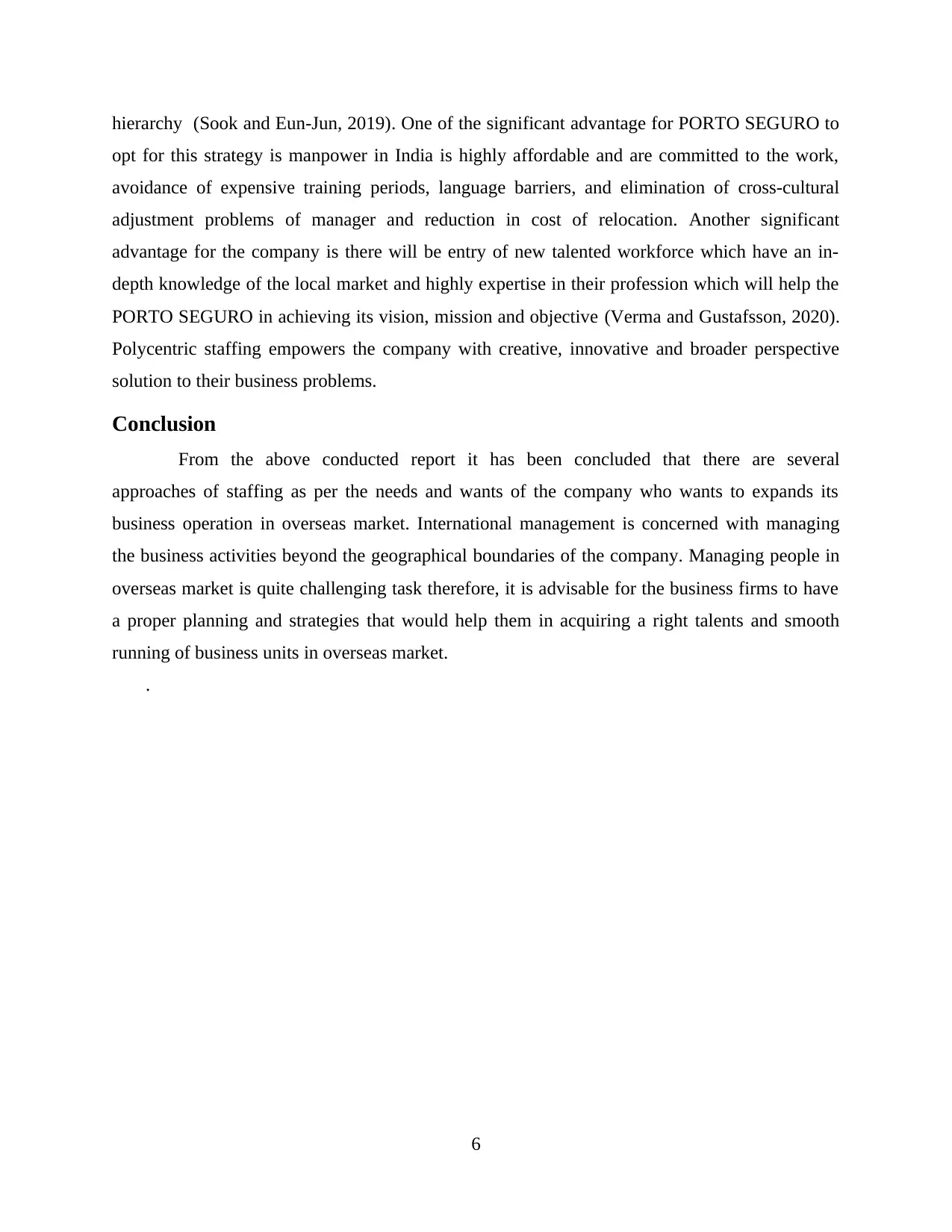
hierarchy (Sook and Eun-Jun, 2019). One of the significant advantage for PORTO SEGURO to
opt for this strategy is manpower in India is highly affordable and are committed to the work,
avoidance of expensive training periods, language barriers, and elimination of cross-cultural
adjustment problems of manager and reduction in cost of relocation. Another significant
advantage for the company is there will be entry of new talented workforce which have an in-
depth knowledge of the local market and highly expertise in their profession which will help the
PORTO SEGURO in achieving its vision, mission and objective (Verma and Gustafsson, 2020).
Polycentric staffing empowers the company with creative, innovative and broader perspective
solution to their business problems.
Conclusion
From the above conducted report it has been concluded that there are several
approaches of staffing as per the needs and wants of the company who wants to expands its
business operation in overseas market. International management is concerned with managing
the business activities beyond the geographical boundaries of the company. Managing people in
overseas market is quite challenging task therefore, it is advisable for the business firms to have
a proper planning and strategies that would help them in acquiring a right talents and smooth
running of business units in overseas market.
.
6
opt for this strategy is manpower in India is highly affordable and are committed to the work,
avoidance of expensive training periods, language barriers, and elimination of cross-cultural
adjustment problems of manager and reduction in cost of relocation. Another significant
advantage for the company is there will be entry of new talented workforce which have an in-
depth knowledge of the local market and highly expertise in their profession which will help the
PORTO SEGURO in achieving its vision, mission and objective (Verma and Gustafsson, 2020).
Polycentric staffing empowers the company with creative, innovative and broader perspective
solution to their business problems.
Conclusion
From the above conducted report it has been concluded that there are several
approaches of staffing as per the needs and wants of the company who wants to expands its
business operation in overseas market. International management is concerned with managing
the business activities beyond the geographical boundaries of the company. Managing people in
overseas market is quite challenging task therefore, it is advisable for the business firms to have
a proper planning and strategies that would help them in acquiring a right talents and smooth
running of business units in overseas market.
.
6
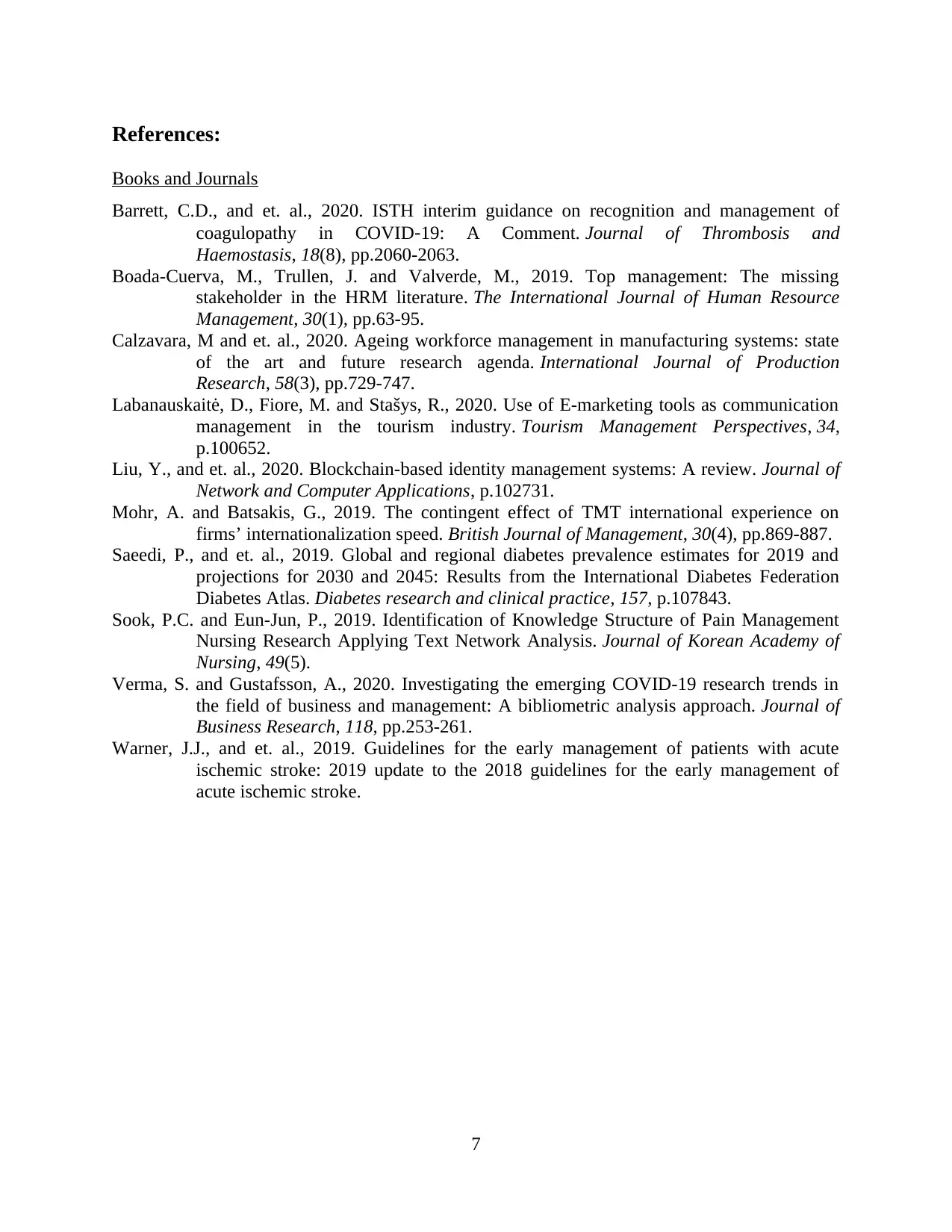
References:
Books and Journals
Barrett, C.D., and et. al., 2020. ISTH interim guidance on recognition and management of
coagulopathy in COVID‐19: A Comment. Journal of Thrombosis and
Haemostasis, 18(8), pp.2060-2063.
Boada-Cuerva, M., Trullen, J. and Valverde, M., 2019. Top management: The missing
stakeholder in the HRM literature. The International Journal of Human Resource
Management, 30(1), pp.63-95.
Calzavara, M and et. al., 2020. Ageing workforce management in manufacturing systems: state
of the art and future research agenda. International Journal of Production
Research, 58(3), pp.729-747.
Labanauskaitė, D., Fiore, M. and Stašys, R., 2020. Use of E-marketing tools as communication
management in the tourism industry. Tourism Management Perspectives, 34,
p.100652.
Liu, Y., and et. al., 2020. Blockchain-based identity management systems: A review. Journal of
Network and Computer Applications, p.102731.
Mohr, A. and Batsakis, G., 2019. The contingent effect of TMT international experience on
firms’ internationalization speed. British Journal of Management, 30(4), pp.869-887.
Saeedi, P., and et. al., 2019. Global and regional diabetes prevalence estimates for 2019 and
projections for 2030 and 2045: Results from the International Diabetes Federation
Diabetes Atlas. Diabetes research and clinical practice, 157, p.107843.
Sook, P.C. and Eun-Jun, P., 2019. Identification of Knowledge Structure of Pain Management
Nursing Research Applying Text Network Analysis. Journal of Korean Academy of
Nursing, 49(5).
Verma, S. and Gustafsson, A., 2020. Investigating the emerging COVID-19 research trends in
the field of business and management: A bibliometric analysis approach. Journal of
Business Research, 118, pp.253-261.
Warner, J.J., and et. al., 2019. Guidelines for the early management of patients with acute
ischemic stroke: 2019 update to the 2018 guidelines for the early management of
acute ischemic stroke.
7
Books and Journals
Barrett, C.D., and et. al., 2020. ISTH interim guidance on recognition and management of
coagulopathy in COVID‐19: A Comment. Journal of Thrombosis and
Haemostasis, 18(8), pp.2060-2063.
Boada-Cuerva, M., Trullen, J. and Valverde, M., 2019. Top management: The missing
stakeholder in the HRM literature. The International Journal of Human Resource
Management, 30(1), pp.63-95.
Calzavara, M and et. al., 2020. Ageing workforce management in manufacturing systems: state
of the art and future research agenda. International Journal of Production
Research, 58(3), pp.729-747.
Labanauskaitė, D., Fiore, M. and Stašys, R., 2020. Use of E-marketing tools as communication
management in the tourism industry. Tourism Management Perspectives, 34,
p.100652.
Liu, Y., and et. al., 2020. Blockchain-based identity management systems: A review. Journal of
Network and Computer Applications, p.102731.
Mohr, A. and Batsakis, G., 2019. The contingent effect of TMT international experience on
firms’ internationalization speed. British Journal of Management, 30(4), pp.869-887.
Saeedi, P., and et. al., 2019. Global and regional diabetes prevalence estimates for 2019 and
projections for 2030 and 2045: Results from the International Diabetes Federation
Diabetes Atlas. Diabetes research and clinical practice, 157, p.107843.
Sook, P.C. and Eun-Jun, P., 2019. Identification of Knowledge Structure of Pain Management
Nursing Research Applying Text Network Analysis. Journal of Korean Academy of
Nursing, 49(5).
Verma, S. and Gustafsson, A., 2020. Investigating the emerging COVID-19 research trends in
the field of business and management: A bibliometric analysis approach. Journal of
Business Research, 118, pp.253-261.
Warner, J.J., and et. al., 2019. Guidelines for the early management of patients with acute
ischemic stroke: 2019 update to the 2018 guidelines for the early management of
acute ischemic stroke.
7
1 out of 9
Related Documents
Your All-in-One AI-Powered Toolkit for Academic Success.
+13062052269
info@desklib.com
Available 24*7 on WhatsApp / Email
![[object Object]](/_next/static/media/star-bottom.7253800d.svg)
Unlock your academic potential
© 2024 | Zucol Services PVT LTD | All rights reserved.





